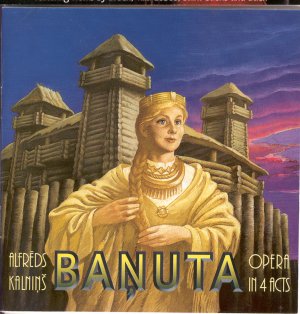This is a romantic nationalist opera set in pagan Latvia.
It remains in the standard repertoire of Latvian Opera to this day occupying
a place in Latvia comparable to that helf by Erkel's Bank Ban in
Hungary.
Alfreds Kalnins established himself as an organist
and composer of songs. When this opera catapulted onto the scene in
1940, complete with an ending conforming to Soviet ideology, the public
were not prepared for it. Kalnins had overhauled the score while he
was living in New York between 1927 and 1933. The politically-rehabilitated
text was the version used in Latvia until, in 1979, with Perestroika
radiating outwards from Moscow, the Latvians felt able to restore the
original tragic ending. The original version's premiere in the West
was at New York's Carnegie Hall on 5 June 1982.
Quite apart from the heroic and passionate exchanges
between the principals this is an opera that makes extensive use of
the chorus rather like Boughton's Queen of Cornwall and Alkestis.
Here the chorus provide the crowd scenes and commentary - an analogue
of the Latvian people just as Mussorgsky's choirs in Kovantschina
speak for the downtrodden Russian people.
The plot follows a tragic storyline echoing 'Romeo
and Juliet'. Banuta, a captured princess, is led back to Latvia by Prince
Daumants. They are to be married. Daumants is killed by Vizuts the brother
of Yargala who had been raped by Daumants when she refused his offer
of marriage. To cut a long story shorter, Banuta falls in love with
Vizuts and only when the two declare their mutual love in Act 4 does
Vizuts confess to killing Daumants. Mortefied by guilt and sorrow the
two commit suicide by stabbing each other.
This is a grand grand opera running the gamut of incident
and requiring the usual infusions of credibility suspension. Along the
way we get a welcome homecoming, triumphalism (especially in Act 1),
a murder, a love-ban oath, midsummer frolics à la Smetana, carousal,
love duets, a frustrated human sacrifice - complete with druids, woodland
interludes, dawn awakenings (listen to the birdsong rustlings at act
4 0917) and a well paced Liebestod.
In Act 3 Kalnins taps a folk dance tradition explored
by Dvorak and Smetana in Czechoslovakia and Ludolf Nielsen in Denmark.
There is also a dash or ten of the dissolute carpe diem abandon
of Part II of Bantock's Omar Khayyam. The meditative orchestral
material often crosses Mussorgsky's Dawn on the Neva and Dvorak's
New World.
The soprano role of Banuta is a true barnstormer and
in her stormy climactic moments I was forcefully reminded of both Iolanta
and Onegin by Tchaikovsky (the former a very strong opera contemporary
with the Fourth Symphony) and of Rachmaninov's opera Francesca da
Rimini. At 21.44 (Act 3) there is some especially fiery work for
Banuta and it is unstoppably delivered by Regina Frinberga à
la Raili Kostia (in the EMI Berglund-Bournemouth Kullervo); would
that Karlis Zarins (as Vinuts) had been another Jorma Hynninen. The
superheated mood is heightened by some pretty stark brass work, for
example at 19.03 (Act 3).
The start of Act 3 has a sincere touch of Tchaikovsky's
Winter Daydreams crossed with Borodin's Second Symphony and Brahms'
Fourth. The choral singing by the women is simultaneously pristine and
soft-focused like the Delian 'haze' in Patrick Hadley's The Trees
(listen to the Lyrita LP if you can). The carousing among the young
women, old men and young men is adeptly done with much cheery interplay
reflected in the stereo separation. The parallels are with Howard Hanson's
choral dances from Merry Mount - another work of the 1930s.
The last Act features some extremely lyrical music
reminiscent of Fibich. In fact this opera could easily be a modern-ish
counterpart of The Bride of Messina and Sarka by Fibich
or, closer to home (Kalnins'), Madetoja's Juha or Peterson-Berger's
Arnljot.
It is irritating that the tracking is rather stingy
- four tracks in total across two discs: two per disc - one track for
each of the four acts. With an unfamiliar work recorded with some hope
that it might make its way beyond the Latvian communities, native and
émigré, it would have been kinder to offer multiple tracking
within acts to key scenes and incidents. The notes are so-so giving
barely adequate information on Kalnins, a synopsis plus a full sung
text with side-by-side translation into English.
The recording was sponsored by the Latvian National
Opera Guild.
This work is a bit of a Russian nationalist throwback
but it is a stirring piece and will appeal especially to anyone who
appreciates their operas with a dominant role for the choir. If you
can't get enough in the way of nationalist operas then don't delay.
The only downside is the parsimonious tracking. One track per Act in
an opera running circa two and a half hours is not enough. There is
no shortage of commitment among the singers and orchestra which promises
well for their CDs of Eugene Onegin. I do hope that Rigas Skanu
will go on to record more Latvian opera to carry the good work to a
world that would like to hear more of this music.
Rob Barnett
AVAILABILITY:-
sales@balticshop.com
SKU#: 2221
Description: Kalnins, Alfreds - Banuta (opera)
Price: $20.95
BalticShop.com, LLC
1616 Post Road, #5543
Fairfield, CT 06430, USA
Phone (203) 362-0150 to provide credit card information.
www.balticshop.com


